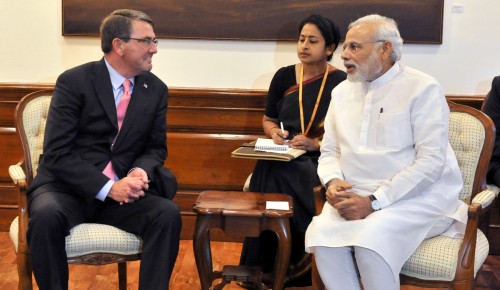
India and the US signed a new framework agreement for closer cooperation in defence as visiting US Secretary of Defense Ashton Carter met Prime Minister Narendra Modi and External Affairs Minister Sushma Swaraj and conveyed India was an important strategic partner.
The agreement was signed by India’s Defence Minister Manohar Parrikar and Carter.
Carter earlier met Modi, Sushma Swaraj and National Security Adviser Ajit Doval.
During his meeting with the prime minister, Modi expressed hope that the US companies, including those in the defence manufacturing sector, would actively participate in the ‘Make in India’ initiative and set up manufacturing units in India with transfer of technology and link to the global supply chain.
Carter conveyed that India was an important strategic partner for the US and the US policy of rebalance in Asia-Pacific complimented India’s ‘Act East’ Policy.
Carter and Modi also exchanged views on regional issues, including the situation in Afghanistan, and the recent developments in the Indian Ocean and the Asia Pacific region.
The defence framework agreement meanwhile focuses on taking “appropriate measures to enhance India’s defence capability”. Among other things, India and the US agreed to cooperate on jet engines, aircraft carrier design and construction, and other areas.
The two sides also agreed to pursue co-development and co-production projects that will offer “tangible opportunities” for American defence industries to build defence partnership with Indian industries including in manufacturing under ‘Make in India’.
The 10-year defence framework agreement was renewed during the visit of US President Barack Obama in January. The first framework agreement, which expires this year, was signed in the US in 2005 by the then defence minister Pranab Mukherjee and his then US counterpart Donald Rumsfeld.
Speaking after signing the agreement, Parrikar said “further synergies will result in better output”.
An official statement said that in their meeting, Parrikar and Carter discussed the bilateral defence relationship, and the broader India-US Strategic Partnership.
The two sides reaffirmed their commitment to expand and deepen the bilateral defence relationship and also reviewed the existing and emerging regional security dynamics.
The 2015 Framework for the India-US Defence Relationship builds upon the previous framework and successes to guide the bilateral defence and strategic partnership for the next 10 years. It provides avenues for high-level strategic discussions, continued exchanges between the armed forces of both countries, and strengthening of defence capabilities.
The framework also recognises the transformative nature of the Defence Technology and Trade Initiative (DTTI).
Both India and the US have finalised two project agreements for joint development of mobile electric hybrid power sources and the next generation protective ensembles.
Engaging bilateral cooperation in areas of mutual interest, such as maritime security and knowledge partnership in the field of defence was also agreed upon.
Carter also thanked Parrikar for the help extended in the search for a US helicopter which went missing during the relief operations in quake-hit Nepal. He also invited Parrikar to visit the US for the next meeting which Parrikar accepted.
Earlier, Carter, who was on his first visit to India as defence secretary, laid a wreath at the Amar Jawan Jyoti memorial at India Gate, the World War I monument.
Carter, who arrived in Visakhapatnam on Tuesday, has visited the Eastern Naval Command and the indigenous stealth frigate, INS Sahyadri.